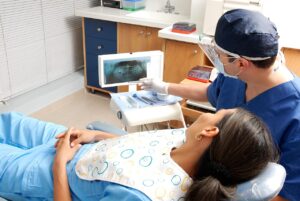How Your Health is Directly Related to Your Mouth

Diane Groppe
Health starts in the mouth, but there is more to a healthy mouth than simply brushing and flossing. There is a whole nutritious approach that directly affects our body systems. There are specific vitamins and minerals that are essential to our everyday health. The best place to receive specific information for your particular case is your dentist. I was surprised by some of the information provided, maybe you will be too!
What we eat directly affects our health
What we eat directly effects our teeth, mouth, and body. Dr. Arden O. Pulley, D.M.D. has a great deal of information concerning our overall health, especially in relation to our mouth and teeth. He begins by writing about the reduction of sugar, especially high fructose, is a must to maintain a healthy mouth, teeth, and body. Along with the reduction of sugar, Dr. Pulley states that we also need to be, “using xylitol (a sugar substitute), having enough calcium, vitamin D3, Vitamin K2, preventing dry mouth, and getting enough trace elements, especially boron. The combination of (these) is very important for the best metabolism of calcium,” he continues.
The Dangers of Sugar
This is all very interesting, and it all goes hand-in-hand. Dr. Pulley continues, “Sugar changes the bacteria in the mouth and in the intestinal tract increasing bad bacteria and decreasing good or beneficial bacteria. Sugar causes an increase in insulin and insulin causes synthesis of fat and turns off the fat-burning process in the body. This causes you to become hungry soon after you have eaten and can result in undesirable weight gain. If you want to lose weight, cut back on high-glycemic carbohydrates, especially sugar.” Sugar seems to be the root of the health problems of Americans today. Cutting back can be hard because everything we buy seems to have a sugar component in it. If we stick with whole foods it may reduce or eliminate the “sneaky sugar” prevalent today.
How Critical is Vitamin D?
Dr. Pulley also notes vitamin D3 is essential to a healthy mouth and body. “Vitamin D3 was first recognized as important for preventing rickets. A dose of 400IU was sufficient to do this. It was known that high doses of Vitamin D3 could be toxic, so they established an upper limit of 2,000 IU.” Vitamin D3 also benefits bones, muscles, teeth, and our cardiovascular system. “Adequate Vitamin D3 reduces heart attacks by 42% and strokes by 50-65%. It lowers rennin that can cause high blood pressure.” The best way to get D3 is through sunlight, with sunscreen being used to protect our skin.
Vitamin K-What to Know
Another important vitamin to consider for our mouths is vitamin K2. Vitamin K2 can be obtained from cheese, meats and eggs. “Vitamin K2 removes calcium from the blood vessels and uses it to form bone. This benefits the blood vessels and the diseases that occur because of that (i.e. stroke and heart attack) and it decreases osteoporosis. This increases bone mass and mechanical strength and enhances collagen structure in the bones,” and the Doctor continues, “Vitamin K2 protects against coronary heart disease, cancer, stroke, Alzheimer’s Disease, Diabetes (helps to control blood sugar), reduces Cytokine (a substance that creates inflammation and is a factor in Arthritis and diseased blood vessels. The combination of K2 and D3 helps to form healthy bones and teeth.” As always check with your healthcare provider for your own personal situation.
Minerals and Trace Elements
Dr. Pulley also says that trace elements, such as Calcium, Boron, and Magnesium are important too, and tells us that Boron is essential for bone metabolism and calcification. It prevents osteoporosis, arthritis, and tooth decay. It is also helpful for memory and brain function. Calcium is valuable for tone, strength, longevity, vitality and endurance, to name a few. It is stored in our teeth, blood, and tissues and is needed in every organ in the body, including the brain. The lack of calcium leads to many diseases and degenerative problems. Magnesium helps lower blood pressure and is important to the production of energy. Magnesium and Vitamin D3 are important for the absorption of calcium.
Wow, that is a lot of information from Dr. Pulley. There are so many reasons to keep our teeth healthy. Be sure to check with your healthcare provider or dentist about what is best for you. Everything in our bodies is related, and it all starts with what we put in our mouths! Now that is something to smile about!
What does your dentist recommend?